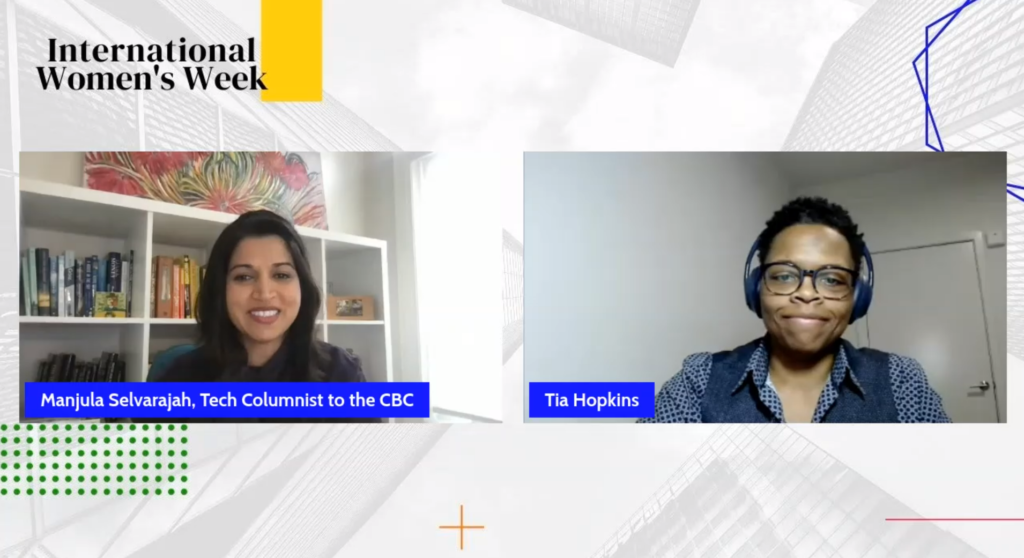
It’s a fast-moving world for the cyber industry with a rapid pace of innovation. Innovation means more data and advanced technology, leaving organizations to remain agile to maintain a competitive advantage, stay ahead of attacks, and improve cyber resilience.
Where does this leave the industry? Pressure for the supply of cybersecurity talent. And the challenge is not just simply a labour gap—it is a gender and diversity gap where diversity of backgrounds, ideas and experiences from all walks of life can drive forward cybersecurity solutions.
During the International Women’s Week event, Women Leading Globally in Cyber: Breaking Barriers, Boundaries and Billion-Dollar Markets, the focus was on the critical need to build a diverse and inclusive talent pipeline for the global cyber industry.
Moderated by Tech Reporter and CBC National Columnist Manjula Selvarajah, Tia Hopkins, global award-winning cybersecurity leader, joined the virtual stage for an authentic and actionable insight-filled discussion to empower, equip, and inspire women in cyber with fundamental takeaways to accelerating diversity for the industry.
Tia Hopkins is a Field CTO and Chief Risk Strategist for eSentire. She has over two decades of experience in various IT and IT security roles and is a published author, speaker and adjunct professor of cybersecurity at Yeshiva University. In 2020, she was awarded The Software Reports’ Top 25 Women Leaders in Cybersecurity and The Cyber Defense Magazine’s Top 100 Women in Cybersecurity. And on top of everything, she’s Founder of Empow(H)er Cybersecurity, an organization focused on diversifying the cybersecurity talent pipeline by empowering, mentoring, and providing career opportunities for women of colour.
Keep reading to learn:
- How to overcome imposter syndrome
- The critical role networking plays in the cyber industry
- The power of mentorship to level up
- The importance of communicating your expertise
Your motto is ‘learn the game.’ What does this motto mean to you?
I have a lot of mottos, but the one I carry with me every day and with everything I do is ‘learn the game, play the game, change the game.’ I didn’t realize that this was what I was doing early on in my career. I am a person that likes to understand the environment, key stakeholders, in addition to learning how to foster relationships and drive efficiencies cross-functionally. So that’s the learning part.
Play the game is getting in. Drive value, develop the business, create opportunities for others to do the same. And then change the game once you’ve been able to add value. When folks see your name when you’re not in the room, trust in your opinions, and believe in your ideas, you then have a unique opportunity to institute change.
I got to a point in my career where I felt like it would be irresponsible of me not to leverage the platform that I had to be a voice for those that did not have a voice and use it as a light to guide the path for others. Once you get to a place where you can change the game, you can leverage that in your career and drive more diversity within the industry.
What are some of the challenges you have faced and the greatest lessons you’ve taken along your journey?
Imposter syndrome is an obvious one for me. I don’t do anything for accolades or recognition. I’m wired to do the work that needs to be done. For me, great things have come out of what I’ve done. So when I’m presented with an opportunity, I begin to think to myself, the things I’ve done in the past were appreciated because they weren’t my job, and I was going above and beyond. But now, since it’s my job, am I going to excel at it now that it’s an expectation and not just something nice that I’m doing?
Because of not seeing anyone that looked like me, not understanding who I can trust, and what’s a safe space, I had to turn that imposter syndrome on its head and realize I got here because I’m me and to continue to be me because that seems to be working.
It came down to the realization that the lack of someone telling you what to do doesn’t necessarily mean you’re not set up for success. So I took it as an opportunity to chart my path. I dipped my toe in the water with this and spoke up about something to my CEO that I saw a gap. It then turned into an entire program for the organization where I hired individuals and built out security outcomes for customers.
If you’re not speaking up, then you’re not used to being heard.
If you’re not speaking up, then you’re not used to being heard. So the driving force behind what I do—see something, say something. Don’t just bring problems. Bring solutions and make them easy to understand.
Let’s dig into some critical success factors in your journey. How have mentors, role models, and strong networks contributed to your success?
I was not into networking and leveraging social media early in my career. I just wanted to be behind my keyboard, saving the world. But, the more I put myself out there, the more I realized that even if just one person resonated or identified with what I had to say, that’s how change is made. That’s how you create a domino effect.
Relationship building is huge for me, even though it is a form of networking from a relationship perspective. But it’s big because that’s how you learn by asking someone: What’s your day-to-day look like? How does that look when you interact with my team? Is there anything I can do to drive efficiencies there? So you’re able to not only build the relationship but learn a ton about the business as well.
CEOs are so great at what they do because they have the big picture, understand all the functions and how all the pieces work together. So relationship building for me is huge because if I make a decision in a silo that I think will be great for my organizational unit, it may have a negative impact on another team. I want to make sure I am reaching out and building bridges, relationships, and learning the business, introducing efficiencies and not additional friction.
On the front of mentorship, I did not have a mentor until I got to eSentire when my CEO decided to work with me in a mentorship capacity. The organization built a program around it that was the pilot and turned it into a great executive mentorship program for high potential employees. Before this, it was a lot of throwing things at the wall and seeing what stuck, resulting in many missed opportunities, wasted time, and a lot of poor financial decisions.
I wouldn’t change anything about my journey because it landed me where I am. That’s why I am very passionate about giving back and mentoring to show others how to avoid some of the rocks that I tripped over. My passion is rooted in the fact that my journey was so hard.
My passion is rooted in the fact that my journey was so hard.
There is a lot of discussion on the first steps a woman should take to get into cybersecurity or the first course that should be taken. What’s your perspective?
Suppose you’ve ever asked someone what certifications or degree you should achieve or go after, and they answer you without asking who you are and what your desired outcomes are as a cybersecurity professional. In that case, it’s bad advice because they know nothing about you.
I always advise to think about the following questions:
- Why are you here?
- Why do you want to be in the cybersecurity industry?
- What does the ideal 9 to 5 look like for you? Do you want to work after hours? And if so, what roles align with that?
- What transferable skills do you have?
- Are you entry-level? Or is there something about your background that will level you up into something that aligns with what you’re familiar with?
Knowing your ‘why’ is critically important.
I entered the industry when cybersecurity was not sexy, and now everyone wants to do it. So now there’s information overload with so many resources available. Knowing your ‘why’ is critically important. It’ll be difficult to be passionate about something if you’re not doing it because you want to or understand why you’re doing it.
Also, be motivated. It’s hard enough to wake up in the morning and do something you’re passionate about versus dragging around things you’re doing because someone else told you that you should.
How important is it for women in cybersecurity to communicate their expertise outside of the workplace?
It’s critically important. Representation stands out the most for me. A lot of the things I’ve gone after were because I saw someone I related to doing it, and I thought maybe I could do that too. It is really important for women who have figured it out, have a platform, and show the masses that it can be done. Show women wondering if there’s a place in this industry for them.
It’s really important for women to speak up, be seen, and be out there otherwise, the industry won’t look like a place for women to be successful.
In cybersecurity, whether you’re coming in with the most incredible technical background, great communication skills, or you’re great at analyzing data, whatever it is, there’s a place for you in the industry. It’s really important for women to speak up, be seen, and be out there otherwise, the industry won’t look like a place for women to be successful. Then there won’t be a high degree of confidence that this is a career that they should even consider.
Are you seeing a change in the cybersecurity industry around new opportunities, advancement, or an increase in the number of women of colour coming into this field?
I see a change, but there’s a long way to go. It’s not nearly the level of change that we need to see. Starting with awareness is key. The industry has acknowledged that we need to do something about it and is doing its best to determine what diversity means and how to diversify the talent pipeline.
All you have to do is be ready to walk through and believe in yourself, which translates into organizations believing in you.
10-20 years ago, women in the industry did not see today’s awareness and effort. Whether women are in the industry or trying to get into the industry, women are showing up. Companies are looking for women. The doors are starting to open. All you have to do is be ready to walk through and believe in yourself, which translates into organizations believing in you. Again, we have a long way to go, but where we are today gives me a lot of hope.
Listen to the recorded session of the IWW 2022: Women Leading Globally in Cyber on our YouTube Channel, along with other inspirational IWW 2022 events.
Make the most of IWW 2022 by checking our complete March calendar of IWW 2022 events.
Catch all the actionable insight and inspiration of International Women’s Week! We are excited to come together with collaborators from our region, across Canada and around the world for this empowering month. Dozens of partners are joining us to promote women in leadership, host and contribute to events, and engage participants from Canada’s Capital and anywhere on Earth.






